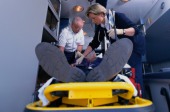- 8 Ways to Increase Dopamine Naturally
- 7 Best Breads for Maintaining Stable Blood Sugar
- Gelatin vs. Collagen: Which is Best for Skin, Nails, and Joints?
- The Long-Term Effects of Daily Turmeric Supplements on Liver Health
- Could Your Grocery Store Meat Be Causing Recurring UTIs?
- Are You Making This Expensive Thermostat Error This Winter?
- Recognizing the Signs of Hypothyroidism
- 10 Strategies to Overcome Insomnia
- Could Artificial Sweeteners Be Aging the Brain Faster?
- Techniques for Soothing Your Nervous System
Divorce May Raise Risk of Accidental Death


TUESDAY, Nov. 12Divorce may have another downside: a higher chance of meeting up with a fatal accident.
That’s the finding of a new study that also finds higher rates of accidental death for people with low levels of education. The report was published online recently in the journal Social Science Research.
The study authors tracked data from 1.3 million Americans aged 18 and older who survived or died in accidents between 1986 and 2006.
Divorced people were two times more likely than married people to die from the most-preventable causes of accidental death — hazards such as fire or poisoning. Both groups had an equal risk of dying from the least-preventable causes of accidental death, for example, things such as airplane or boat accidents.
Single people were also two times more likely than married people to die from the most-preventable causes of accidental death and just as likely to die from the least-preventable causes, the investigators found.
People with low levels of education were more than twice as likely as those with higher levels of education to die from the most-preventable causes of accidental death. Education level did not play a role the least-preventable causes of death, however.
“Well-educated individuals, on average, have greater [financial] resources, which can be used to their advantage to prevent accidental death (i.e., safeguarding a home from fire),” study lead author Justin Denney, an assistant professor of sociology at Rice University, said in a university news release.
According to Denney, better-educated people are often better informed about common health hazards, such as alcohol and drug abuse. He also believes that married folk tend to offer each other encouragement and support in staying healthy, and may be on hand to help when a partner faces a health emergency.
More information
The National Safety Council offers advice on home and recreational safety.
Source: HealthDay
Copyright © 2026 HealthDay. All rights reserved.










